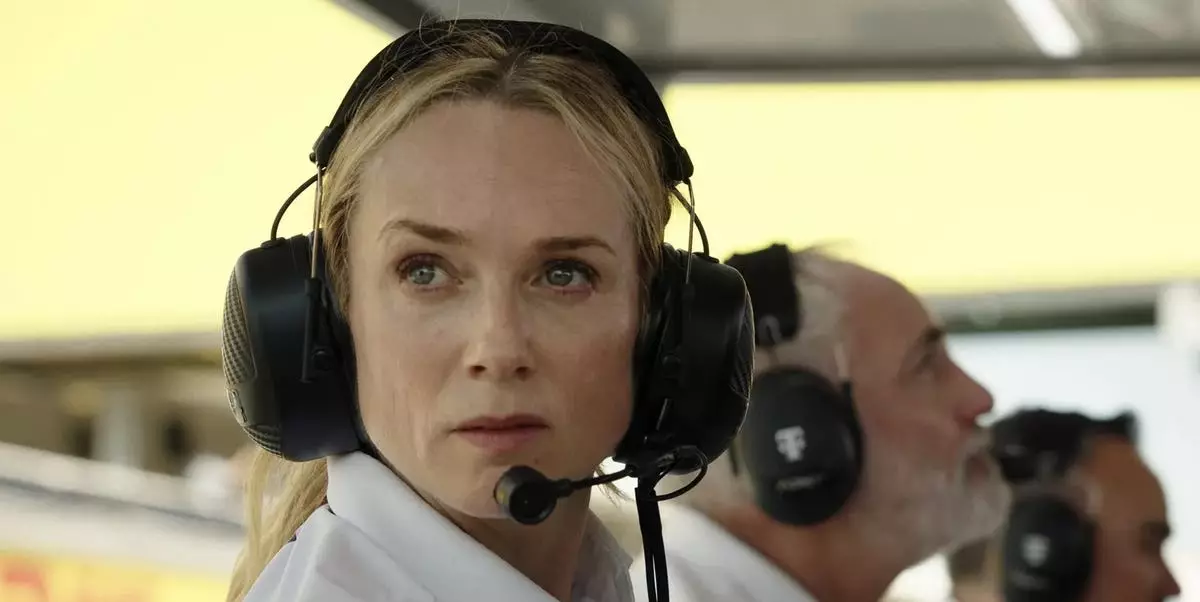While Hollywood often romanticizes front-runners like Damson Idris and Brad Pitt for their roles in the latest F1 blockbuster, true innovation and resilience lie behind the scenes, embodied by women whose stories are seldom spotlighted. Kerry Condon’s portrayal of Kate McKenna, a fictional technical director, underscores a crucial narrative: behind every roaring engine and strategic victory, there are pioneering women whose contributions reshape the sport’s landscape. Yet, their stories remain underrepresented, demanding a reevaluation of what it truly means to excel in this fiercely competitive arena.
Condon’s character was inspired by real figures whose careers exemplify determination and expertise, most notably Bernie Collins. An Irish-born engineer and strategist, Collins’s journey from Queen’s University Belfast to the pinnacles of F1 embodies a blend of talent, perseverance, and strategic insight. Her academic background in mechanical engineering laid the foundation for a career marked by strategic innovation at prominent teams like McLaren and Aston Martin. Condon’s admiration for Collins reflects a broader recognition: these women do not just participate—they redefine the very essence of F1 engineering, pushing boundaries with every race.
What sets Collins apart is her ability to fuse technical mastery with storytelling—she embodies the type of strategic thinker who uses both science and an intuitive understanding of racing psychology to win. Condon’s decision to incorporate her background into her character demonstrates an authentic respect for the intricacies of the sport and its history—an acknowledgment that mastery in Formula 1 is as much about mental agility as it is about engineering prowess.
The Power of Representation: Inspiring Future Generations
In crafting her role, Condon didn’t solely rely on Collins’s technical insights but also sought to understand the personal journey behind such success. Engaging with Ruth Buscombe, a trailblazing motorsport engineer, highlighted a different dimension: the importance of early inspiration and accessible pathways. Buscombe’s path from Cambridge’s aerospace engineering programs to roles at Ferrari, Haas, and Sauber exemplifies the diverse routes women have taken to reach the upper echelons of motorsport. Her career trajectory underscores an essential message—motorsport is no longer a male-only domain; it is a landscape ripe for innovation driven by diverse talent.
Buscombe’s story also illuminates the importance of perseverance. Her early fascination with engineering, paired with her academic pursuits, laid a solid foundation for her career. Today, she serves as a role model, proving that dedication transcends gender stereotypes—a narrative Condon recognizes and passionately champions. Her insights on the set helped deepen the authenticity of her character and reinforce the importance of representation in shaping the sport’s future.
The convergence of these stories paints a compelling portrait of a sport gradually shifting towards inclusivity. Yet, much work remains. These women’s journeys are emblematic of the silent revolution happening in F1—an industry that increasingly values expertise and strategic thinking over traditional notions of masculinity. Condon’s role is more than entertainment; it’s an invitation to celebrate and elevate these unsung heroes.
Transforming F1: From Old Paradigms to Progressive Realities
The historic underrepresentation of women in motorsport often reflects broader societal barriers that persist despite recent progress. However, now more than ever, the conversation is shifting. The visibility of Roberts and Collins, among others, serves as a catalyst for cultural change, inspiring young women to pursue careers in engineering and strategic analysis within high-performance sports. Their stories challenge the stereotypical image of motorsport as a testosterone-fueled boys’ club, emphasizing that intellect, resilience, and passion are universal attributes.
For the sport to truly evolve, industry stakeholders must take active steps to foster inclusivity — mentorship programs, targeted recruitment, and visible role models. The power of storytelling, such as Kerry Condon’s portrayal of Kate McKenna, plays a pivotal role in reshaping perceptions. It humanizes these professionals, transforming abstract notions of technical expertise into relatable narratives of ambition and achievement.
As F1 accelerates into new technological eras—embracing data analytics, hybrid powertrains, and AI—women like Collins and Buscombe demonstrate that the future is collaborative, diverse, and driven by innovation. Their contributions, often undervalued, are the real motors that keep the sport racing forward. Elevating their stories isn’t just about fairness; it’s about recognizing that excellence comes in many forms and that the sport’s most impactful innovations are often powered by the quiet resolve of trailblazing women hidden behind the scenes.

